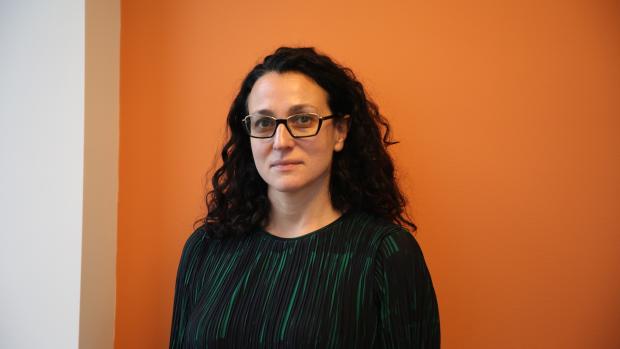Helping companies hire responsibly ... from day one
Institute Associate Professor Julia Stoyanovich addresses a high-profile conference of business leaders

Julia Stoyanovich recently spoke about the benefits and pitfalls of using AI during the hiring process
From Day One is a conference series focused on proven ways for companies to build a culture of diversity, responsibility, and transparency into business practices, and organizers aim to provide attendees with real, actionable, transformative ideas they can use, as the name states, “from day one.”
On September 15, they mounted an event that asked: What are the best ways of recruiting the diverse workforce of tomorrow? How can they use digital tools to spot talent in the marketplace as well as finding candidates for advancement in their own workforces?
They turned to Institute Associate Professor of Computer Science and Engineering Julia Stoyanovich, who directs NYU Tandon’s Center for Responsible AI, to address an important issue: the benefits and pitfalls of using AI during the recruitment, screening, and hiring process.
She made several salient points during her far-ranging talk, and some of the major takeaways included:
- Never assume that algorithmic systems are unbiased; they are trained by humans and are subject to the same biases as those humans. They can even worsen underrepresentation and social divides. (Take, for example, a system trained using data from successful current employees; if that pool contains a lot of Ivy League graduates, the system may disregard candidates who attended historically Black or women’s colleges. That same system may favor applicants with names like Emily and Greg rather than Lakisha or Jamal.)
- Biases emerge in a wide variety of ways and settings: employers requiring applicants to take personality quizzes may inadvertently discriminate against people with mood disorders, or eye-tracking software used in video interviews may disadvantage a blind candidate.
- It’s possible to guard against potentially unfair, prejudicial systems through regulation; one bill under consideration in New York City would require employers to inform job applicants when algorithm-based systems were being used to screen them, as well as the qualifications or characteristics being screened.
- In any field—well beyond Human Resources or Artificial Intelligence—it’s important to have a nuanced view of the technology involved; being overly optimistic about technology’s potential is just as counterproductive as techno-bashing.
“It was a pleasure to address such a large community of business leaders,” said Stoyanovich. “They are the ones with the power to make real change at their organizations, and I hope I motivated them to think more carefully about both the potential benefits and the risks of AI in hiring. Let’s keep the conversation going!”

